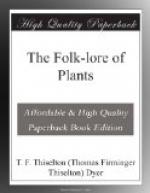On the other hand, that no position in life is exempt from trouble of some kind is embodied in this proverb:—
“Wherever a man dwells he shall
be sure to have a thorn bush
near his door,”
which Ray also explains in its literal sense, remarking that there “are few places in England where a man can dwell, but he shall have one near him.” Then, again, thorns are commonly said to “make the greatest crackling,” and “the thorn comes forth with its point forward.”
Many a great man has wished himself poor and obscure in his hours of adversity, a sentiment contained in the following proverb:—
“The pine wishes herself a shrub when the axe is at her root.”
A quaint phrase applied to those who expect events to take an unnatural turn is:—
“Would you have potatoes grow by the pot-side?”
Amongst some of the other numerous proverbs may be mentioned a few relating to the apple; one of these reminding us that,
“An apple, an egg, and a nut,
You may eat after a slut.”
Selfishness in giving is thus expressed:—
“To give an apple where there is an orchard.”
And the idea of worthlessness is often referred to as when it is said that “There is small choice in rotten apples,” with which may be compared another which warns us of the contagious effects of bad influence:—
“The rotten apple injures its neighbour.”
The utter dissimilarity which often exists between two persons, or things, is jocularly enjoined in the familiar adage:—
“As like as an apple is to a lobster,”
And the folly of taking what one knows is paltry or bad has given rise to an instructive proverb:—
“Better give an apple than eat it.”
The folly of expecting good results from the most unreasonable causes is the subject of the following old adage:—
“Plant the crab where you will, it will never bear pippins.”
The crab tree has also been made the subject of several amusing rhymes, one of which is as follows:—
“The crab of the wood is sauce very
good for the crab of the
sea,
But the wood of the crab is sauce for
a drab that will not her
husband obey.”
The coolness of the cucumber has long ago become proverbial for a person of a cold collected nature, “As cool as a cucumber,” and the man who not only makes unreasonable requests, but equally expects them to be gratified, is said to “ask an elm-tree for pears.” Then, again, foolish persons who have no power of observation, are likened to “a blind goose that knows not a fox from a fern bush.”
The willow has long been a proverbial symbol of sadness, and on this account it was customary for those who were forsaken in love to wear a garland made of willow. Thus in “Othello,” Desdemona (Act iv. sc. 3) anticipating her death, says:—




